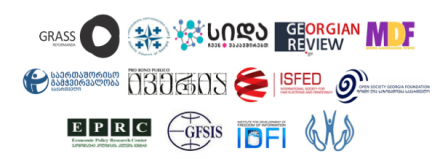 Tbilisi, DFWatch – Georgian NGOs call upon the government to “fundamentally revise” its politics toward Russia, postpone next round of Abashidze-Karasin talks and ensure more involvement of the international community in Georgian-Russian relations.
Tbilisi, DFWatch – Georgian NGOs call upon the government to “fundamentally revise” its politics toward Russia, postpone next round of Abashidze-Karasin talks and ensure more involvement of the international community in Georgian-Russian relations.
17 major NGOs released the statement on Tuesday in the wake of Russian troops installing two border signs up to 1 kilometer inside the territory previously controlled by Georgian authorities.
According to the statement, this move “is a logical extension of Russia’s recent policy of annexation” and represents “an extremely alarming signal for the security of the state.”
“…Strategic infrastructure, such as the Baku-Supsa pipeline, has been threatened. In the near future transmission line Kartli-2 and, most importantly, the central highway may be targeted,” the statement reads.
17 NGOs, among them GRASS, OSGF, TI Georgia, GISS and ISFED, urge Georgian authorities to resort to the special measures.
“It is extremely important to fundamentally revise the strategy of relations with Russia, without which, none of the measures will be effective. The main principle of our strategy should be to handle relations with Russia with involvement and participation of international community.”
The NGOs offer several recommendations, with postponing the next Abashidze-Karasin meeting, in Prague on Wednesday and convening extraordinary session of Geneva talks on top.
Although Georgia has diplomatic relations severed with Russia after 2008 August war, the countries have two formats of negotiations. While the Geneva negotiations, having more political emphasis, are held with the presence of the EU, US and OSCE, Abashidze-Karasin dialogue has a tete-a-tete format and is mostly restricted to trade, economy and humanitarian issues.
The recommendations also refer to intensification diplomatic and security efforts.
One of the recommendations urges the government to resort to “the demarches on the highest level (the President, the Prime Minister) in order to inform our major partners (the US, NATO and the EU states) about the dangers (of Russian politics).”
In the end NGOs offer the government their assistance and ask to hold an emergency meeting in order to discuss Georgia’s immediate security challenges with participation of civil society.

